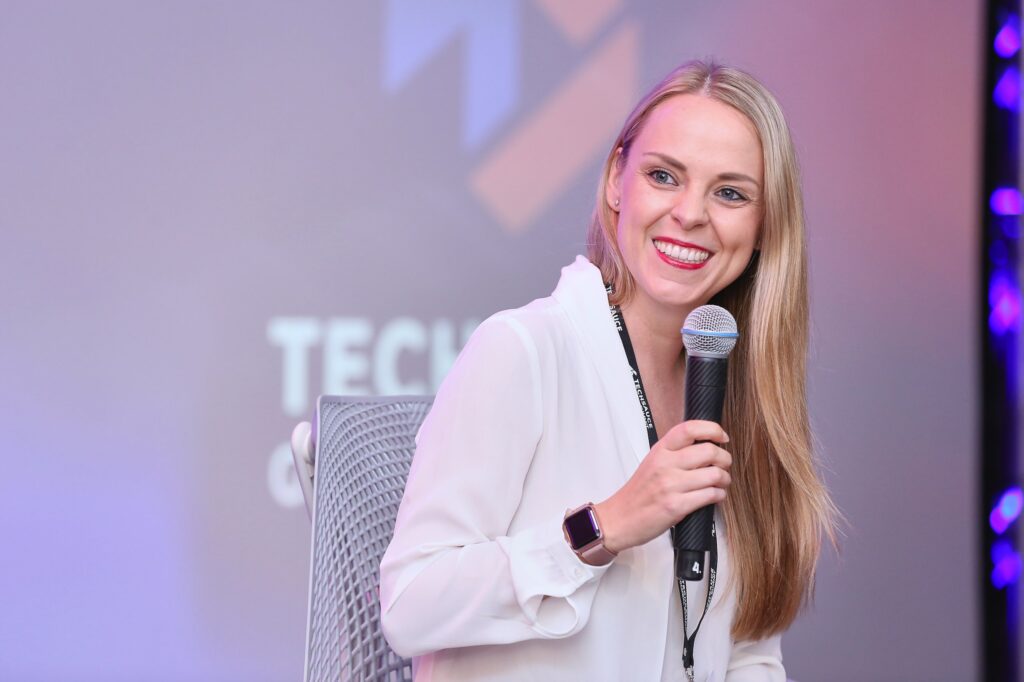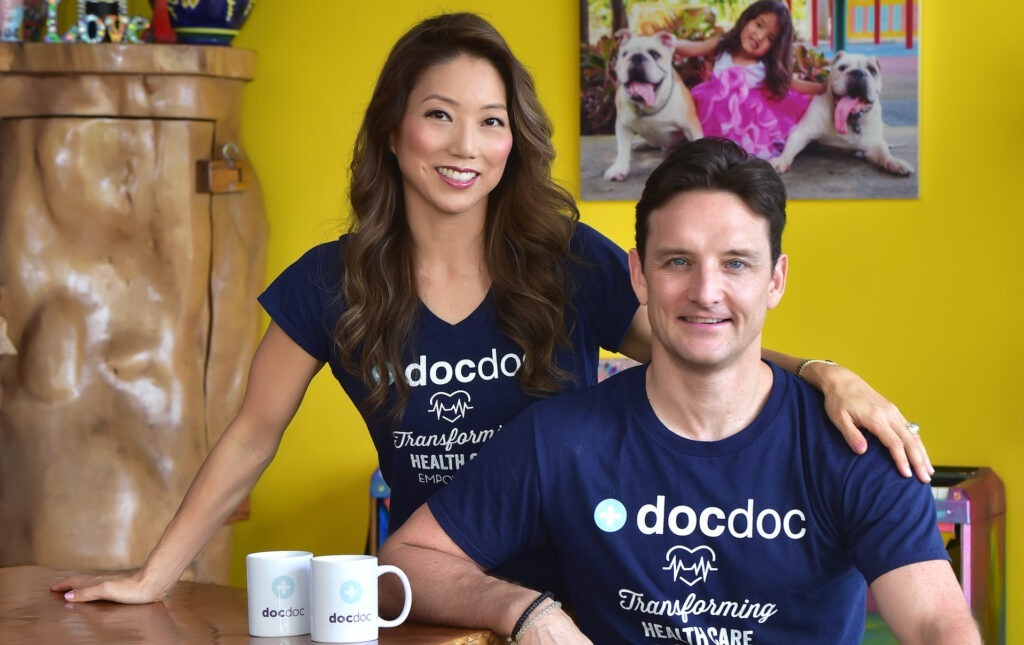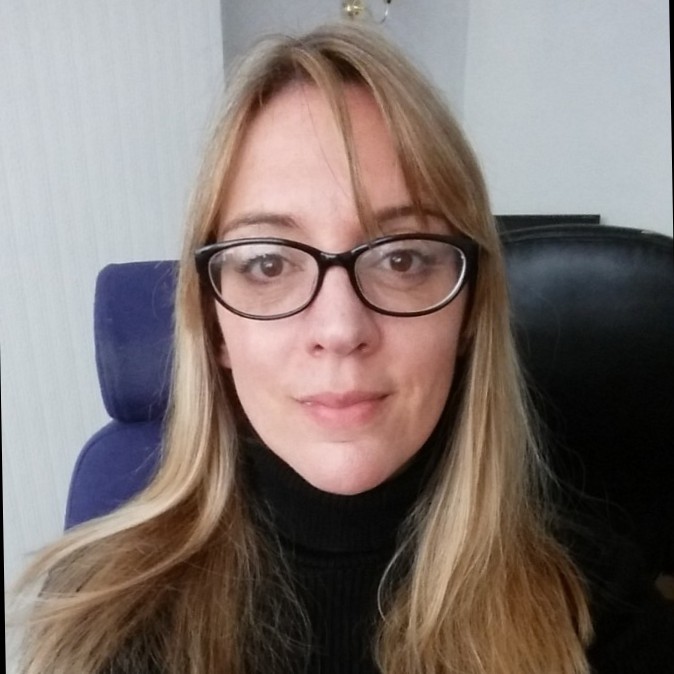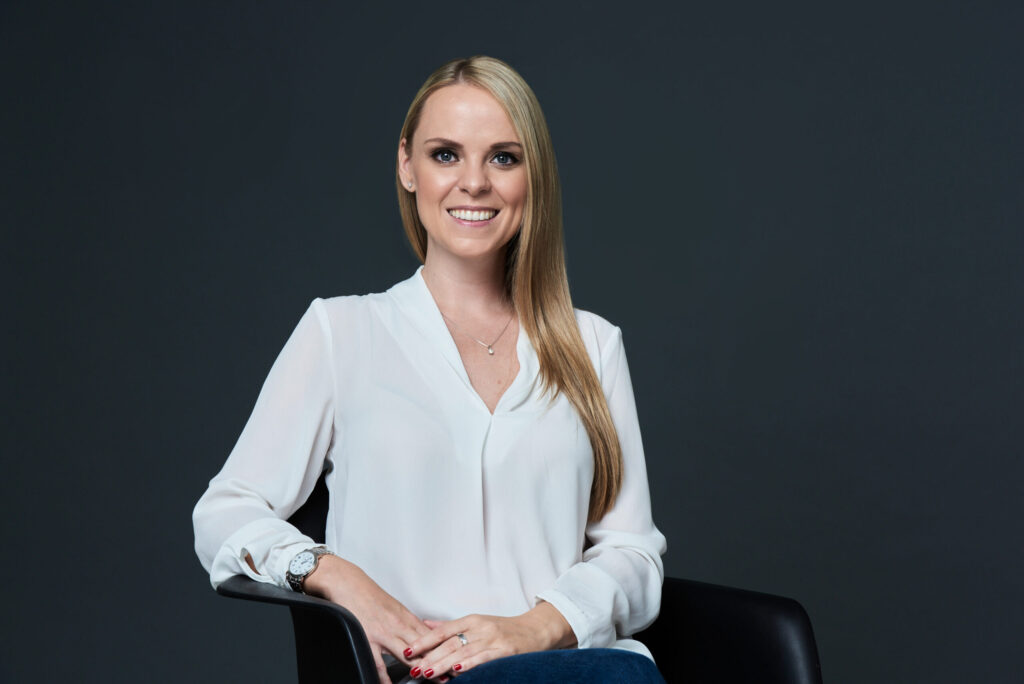German national Theresa Blissing, lives in New York, but is also the Founder of the Asia InsurTech Podcast – one of the most popular and respected podcast channels in the industry. Together with podcast host Michael Waitze, they routinely quizz some of the industry’s most influential figures, from giant corporations to new-on-the scene startup founders and also recently launched the global insurance industry podcast InsurTech Amplified.
One of her recent projects included authoring the tomb ‘The Future of Insurance: From Disruption to Evolution: Volume IV. Asia Rising’ edited by Bryan Falchuk. She also runs her own consultancy – Accelerating Insurance. We caught up with this dynamic founder and broadcaster to find out more.
Can you share a bit about your background and career journey in the insurance industry?
Absolutely. My journey in the insurance industry began back in 2004 with Generali in Germany. I spent over a decade with them, starting at the Frankfurt office and eventually making my way to Generali’s Asia regional headquarters in Hong Kong in 2009. It was a pivotal time as Generali was expanding its presence in Asian markets like the Philippines, Indonesia, and India. This exposed me to the unique challenges and opportunities of developing and emerging markets in Asia, a stark contrast to the mature and saturated market in Germany.
I held various positions within Generali, culminating in my role as the head of the international employee benefit business for the German market. While I enjoyed my time there, I began to question if there was more to life than working for a single insurance carrier. The allure of the dynamic insurance space in Asia led me to take a break and pursue an MBA with a research scholarship at an American university in Bangkok, Thailand.
During my MBA, I delved into the adoption of big data in the Southeast Asian insurance industry, sparking my interest in technology and innovation. This prompted a shift in my career towards management consulting, where I worked for a German consulting company and eventually founded my own consulting and research firm, Accelerating Insurance. My focus was on how technology was reshaping the insurance industry, and I collaborated with startups, accelerators, and even a venture building studio in Thailand.
In 2018, I observed a gap in the understanding of InsurTech in Asia compared to the hype surrounding Western startups. This realisation led to the creation of the Asia Insurtech Podcast in May 2019, which has since become one of the largest insurance innovation-focused podcasts globally. Through the podcast, I crossed paths with Bryan Falchuk, the founder of The Future of Insurance book series, who invited me to contribute a book on the Asian market to his series.
You spent 10 years in Asia, can you share insights into why Asia differs from Europe and the US, and why certain insurance models might not easily transplant from one region to another?
Asia is incredibly diverse, and it’s crucial not to generalise the entire continent. My experience primarily involves Southeast Asia, India, and Hong Kong. Each country has its unique characteristics and challenges. For instance, Indonesia, with its young population and low insurance penetration, presents a different landscape. In countries like Indonesia, there’s no mandatory motor insurance, making it challenging to introduce insurance concepts to a population that lacks exposure.
Emerging Asian markets, particularly in Southeast Asia, have populations that are tech-savvy but may have limited knowledge of financial products, including insurance. The lack of awareness, coupled with cultural factors and superstitions, can make it difficult to sell insurance in traditional ways.

Startups in Asia often take a mobile-first approach, acknowledging that many people’s first internet experiences were through smartphones. This is different from regions like Europe and the US where initial internet exposure often occurred through personal computers.
The success of insurance models also depends on understanding the local context. For example, companies like Qoala in Indonesia focus on agent-enabled solutions to bridge the gap between tech-savvy consumers and the need for human interaction. They design products like flight delay coverage through ride-hailing services to introduce insurance in a more tangible way and create positive associations with the concept.
The challenges and opportunities in Asia arise from a complex interplay of factors. It requires a tailored and localised approach to succeed in this diverse market.
Can you tell us more about your latest venture, InsurTech Amplified?
Absolutely. InsurTech Amplified is an evolution of the Asia InsurTech Podcast and my consulting and research company, Accelerating Insurance. Let me provide a bit of context. Currently, I’m based in New York due to my husband’s assignment with the United Nations, and we’ll be here until January 2026. This shift prompted us to reevaluate the scope of the Asia InsurTech Podcast, which had gained positive feedback and interest from the US and Europe.
In response, we decided to launch InsurTech Amplified earlier this year in June. It serves as our global podcast show, encompassing a broader perspective beyond Asia. While podcasting remains a core component, InsurTech Amplified is evolving into a comprehensive brand that goes beyond just audio content. This aligns with the trajectory of both the Asia InsurTech Podcast and Accelerating Insurance, my Asia-focused business.
Walk us through the process of launching the Asia InsurTech Podcast (which started almost five years ago now) highlighting the initial challenges and successes.
Sure! Launching the Asia InsurTech Podcast was an exciting but challenging endeavour, given that at the time, podcasts were not as prevalent in Asia as they were in the West.
Michael Waitze and I were pioneers in this space, and we were unsure if anyone would actually listen to what we had to say. The turning point for me came during the InsurTech Insights Conference in 2019 in Hong Kong when a lady from METLIFE Lab approached me in the bathroom, expressing her team’s admiration for our work. That moment was pivotal, making me realise that we were making a difference and people were tuning in.
Fortunately, I had the advantage of partnering with Michael, who already had experience running podcasts. The initial version was a simple website featuring diverse guests, but it quickly evolved into a robust community within the Asian market. Our goal was always to build a strong community and tell the stories of others rather than seeking the limelight ourselves.
As the producer and content curator, I played a crucial role in shaping the direction of the podcast. Michael, with a background in finance but limited experience in insurance, honed his skills as a moderator, guiding engaging conversations. The early days required collaboration, drawing on my extensive insurance experience to identify suitable guests and topics.
Over time, Michael became a pro, and our focus remained steadfast on the guests and content rather than self-promotion. The success of the podcast opened doors to collaborations with insurers, leading to the creation of dedicated podcast and video cast shows like Insurance for the New Possible.
Our approach revolves around storytelling and understanding industry trends, using the power of narrative to propel the insurance industry forward. This philosophy seamlessly extends to my latest venture, the book on the Asian market, adding another dimension to our commitment to advancing the industry through impactful storytelling.
You’ve interviewed numerous industry experts over the years. How many podcasts do you produce in a month, and do any particular interviews stand out to you?
Up early 2023, we released an episode every week for the Asia InsurTech Podcast, accumulating over 200 episodes with guests. Additionally, we had a monthly News Roundup format where we discussed the month’s InsurTech news in Asia. Combining both, we are close to 300 episodes for the Asia InsurTech Podcast. With the launch of InsurTech Amplified, we initially alternated between the Asia InsurTech Podcast and the new global show.
Now, due to its growing popularity, we are moving towards having an episode on InsurTech Amplified almost every week.As for standout interviews, I have a preference for episodes featuring startups. Their unpolished and authentic narratives often make for more engaging conversations. We deliberately avoid providing questions beforehand, fostering an authentic and spontaneous atmosphere.
This approach can be challenging for big corporations who often seek predetermined questions, but we prioritise authenticity over a scripted conversation.
While we’ve had significant names like Jonathan Larson from Ping An and Russell Higginbotham, former CEO of Swiss Re in Asia, some of the most interesting conversations, in my opinion, have been with startup founders. Notably, Kamesh Goyal, the founder and chairman of Digit, a neo insurer in India. His approach of blending traditional insurance practices with a mobile-first, digital strategy is fascinating.
Another noteworthy interviewee is Rohit Nambiar from Tune Protect, a young insurer part of the AirAsia group. Rohit’s openness and bold statements, such as “If you’re not ready to be fired, you will never be able to innovate,” bring a bit of controversy and challenge the status quo, because they play a crucial role in shaking up the industry and driving innovation.
Were there any startups that stood out to you with compelling stories, particularly regarding what motivated their CEOs to start their companies?
Absolutely. One remarkable startup that comes to mind is DocDoc. The founders, Cole Sirucek and his wife Grace Park, had a profoundly personal experience that ignited the creation of their company. Cole and Grace, both originally from the US, moved to Singapore and had a daughter. At the two-month checkup, they received devastating news—their daughter had a rare liver condition and will need a liver transplant to survive.

This is when Cole and Grace experienced firsthand the lack of transparency in the healthcare system and how difficult it is even for well-connected professionals to find the right specialist. The team at the hospital that had diagnosed the condition, were reluctant to answers basic questions like, “How many liver transplants have you done?” and “How much will this cost?” and Grace and Cole wanted a second opinion. The couple leveraged their personal network in the healthcare sector to connect with Dr. Koichi Tanaka, a pioneer in live liver transplants. Dr. Koichi Tanaka later successfully performed the needed liver transplant, making Grace and Cole’s daughter one of the youngest to undergo such a procedure in the world.
The experience also demonstrated that medical costs do not necessarily reflect the quality of care due to this lack of transparency. In the end, the couple paid 60% less than initially quoted and had the most experienced doctor in this field globally perform the procedure. This experience prompted the couple to start DocDoc in order to empower patients and assist them in finding the right care at the right time.
DocDoc is the world’s first patient intelligence company. Through their ecosystem partners, they provide insurance solutions to empower their members with the information they need to make optimal healthcare decisions. DocDoc’s AI-powered platform analyses hundreds of data points per doctor and harness the power of artificial intelligence to match patients to the most relevant doctors based on the patient’s unique medical needs and the doctor’s practice patterns.
The motivation behind DocDoc stems from a real necessity, highlighting the need for a global solution to improve healthcare access and quality. It’s a compelling story that emphasizes the impact startups can have on industries born out of genuine need and personal experiences.
You’re now the author of the fourth volume of the Future of Insurance series. Do you plan on updating it annually or exploring other markets?
Yes, I am the author of the fourth volume of the Future of Insurance series, which was originally started by Bryan Falchuk. While Bryan will continue to publish more books in the series, I am also looking at possible additions in the future. We’re also exploring other markets, and there are discussions about having books focused on different regions.
The African insurance market presents a compelling yet underexplored case with significant potential, like the emerging markets in Asia. Unfortunately, these markets frequently suffer from a lack of transparency and information.
My objective is to rectify this by shedding light on the untold stories of opportunities within these emerging markets. Podcasts are a great way to tell those stories, as are books. Especially if they are filled with engaging case studies and firsthand interviews, like my book, The Future of Insurance – Asia Rising.
It’s also available on Audible, right? Did you create the voiceover yourself?
Ah, recording the audiobook, let me tell you, that was trekking through uncharted territory. You’d think, “Hey, I’ve been on podcasts, spoken at events, this should be a breeze.” Nope, total adventure.
It was tricky because English isn’t my native language. So, I had to get comfortable with every word, make them feel at home in my mouth. Pronunciation hurdles slow you down. Some insurance jargons are like tongue twisters.
You can’t be a robot reading a script; it has to sound engaging, like you’re having a chat. But there’s a catch; you also have to pronounce every word correctly. You also can’t read the book in one go. Your voice also changes throughout the day – it’s not the same in the morning as it is in the afternoon. And if you break off mid chapter, and then try to go back an hour later, even then, you find your voice has altered and the change sounds strange.
I broke the process down, chapter by chapter and it really was like climbing a hill. Audiobook recording is a journey for the brave!
Ping An is featured in your book, and it’s interesting to learn that they are the largest motor insurer in the world. What sets them apart, and how have they embraced technology in the insurance industry?
Ping An is a fascinating case in the insurance industry. Launched in 1988 when there were hardly any privately owned cars in China, they have become the largest motor insurer globally. What sets Ping An apart is their forward-thinking approach to technology. They embraced cloud technology fully, moving their entire operation to the cloud between 2010 and 2016. This move is noteworthy, as many large insurers still struggle with adopting cloud technology.
The tech focus of Ping An and their willingness to embrace change and new ways of working contribute to their success. Unlike those who view technological advancements as roadblocks, Ping An sees them as opportunities to enhance their operations. This tech-centric mindset is crucial in today’s rapidly evolving landscape, and Ping An’s approach reflects their commitment to staying ahead in the industry.
The case of Ping An exemplifies the unique characteristics of companies in Asia, especially those catering to a young and tech-savvy population. It highlights the importance of designing innovative products and using alternative distribution channels, such as digital platforms, to reach and engage customers effectively.
The principles you outlined for success in the insurance industry, especially in Asia, are intriguing. Could you elaborate a bit more on the third principle, leveraging the power of partnerships and an ecosystem approach?
The third principle emphasises the importance of insurers forming strategic partnerships and adopting an ecosystem approach. In the context of the book, this involves insurers collaborating with digital platforms and other non-insurance entities to enhance their reach and offerings. Here are some key points:
- Diverse Partnerships: Insurers can benefit from collaborating with digital platforms that may not be primarily focused on insurance. For example, partnerships with fintech companies like PhonePe in India, which initially offered digital payment services but later added insurance to its ecosystem.
- Alternative Distribution Channels: Instead of relying solely on traditional distribution channels, insurers can tap into alternative ones provided by their partners. This could include leveraging the user base of digital platforms to attract customers who may not have engaged with insurance through conventional channels.
- Knowledge and Expertise Sharing: By partnering with non-insurance entities, insurers can gain access to valuable knowledge and expertise in areas such as designing user-friendly digital experiences. This can be crucial when targeting demographics that may be unfamiliar with insurance products.
- Ecosystem Synergies: Insurers can benefit from the synergies within a broader ecosystem. For instance, insurers partnering with digital platforms can offer bundled services or integrated solutions that provide added value to customers.
Overall, the ecosystem approach encourages insurers to think beyond traditional boundaries and seek collaborations that amplify their strengths and reach in the market. It’s about creating mutually beneficial relationships that enhance the overall customer experience and drive innovation.
What are your plans for the podcast and your other projects over the next 12 to 18 months?
So, future plans are brewing on multiple fronts. The podcast is getting a makeover to serve companies internally. Picture this: using the magic of storytelling and podcasts for change management. I’ve noticed this gap where top-level management gets all hyped about innovation, but the folks on the ground might not be feeling the vibe. So, creating a platform for meaningful conversations internally, giving everyone a voice in the innovation journey. It’s not about airing dirty laundry but having real talks to smooth out the wrinkles in the process. I believe in the power of stories to spark change.
Still, on the podcast front, we’re keeping the global show rolling. We’ve got “This Month’s Amplified,” a segment where we dissect major news and issues monthly, adding a dash of David Gritz from InsureTech New York into the mix. A bit of news, a sprinkle of insights, and voilà, you’ve got yourself an engaging podcast segment.
On the advisory side, I’m in the trenches with startups, investors, and insurance bigwigs, helping them fine-tune their strategies, especially in the realms of distribution and product design. Because, let’s face it, the world of insurance could use a splash of fresh ideas and I draw considerable inspiration from the dynamic landscape of emerging markets. The untapped potential in underserved markets across Asia, the Middle East, and Africa is immense and in my view, will usher in the next wave of InsurTech investment. But it’s not only the huge growth potential those markets present. Solutions originating in these markets, often starting on a greenfield, have the potential to drive innovation even in more established and mature markets.
So, in a nutshell, it’s all about amplifying voices, telling stories, and making waves in the world of insurance.
Finally, what fires up your enthusiasm for the industry – and keeps the ideas flowing?
Absolutely. The energy in the US insurance market is quite something, and not necessarily in the most uplifting way. The industry can have a bit of a grim vibe, especially with all those ambulance-chasing lawyers in the mix. It’s a tough crowd here.
But you know what inspires me every morning? It’s the recognition of how crucial insurance is for any economy. It’s the backbone that lets people take risks, bounce back from setbacks, and navigate the unpredictable rollercoaster of life. There’s something noble about it.
In many developed countries, insurance tends to get the short end of the stick, seen as a necessary evil rather than the superhero it truly is. And that’s where Asia stole my heart a bit. There’s this positive vibe, a recognition that insurance isn’t just a necessary burden but a force for good. Bryan even mentioned that my book gives insurance the spotlight it deserves — casting it as the hero, not the villain. It’s a refreshing perspective, and I’m here for it!
Interview by Joanna England

Joanna England is an award-winning journalist and the Editor-in-Chief for Insurtech Insights. She has worked for 25 years in both the consumer and business space, and also spent 15 years in the Middle East, on national newspapers as well as leading events and lifestyle publications. Prior to Insurtech Insights, Joanna was the Editor-in-Chief for Fintech Magazine and Insurtech Digital. She was also listed by MPVR as one of the Top 30 journalist in Fintech and Insurtech in 2023.










